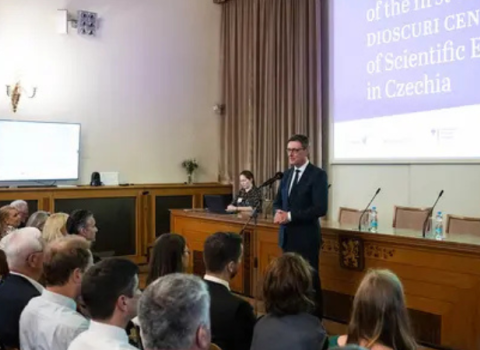Twinning continues to dominate plans for 2026, with a budget set at €223 million

Photo credits: Adolfo Félix / Unsplash
The European Commission has increased the amount it plans to allocate to Widening in the final two years of Horizon Europe, although not by enough to match the €506 million set aside for 2025.
According to a draft work programme approved by the Commission in November, €485.03 million will be allocated to strengthening Widening participation and the European Research Area (ERA) in 2026 and €469.94 million in 2027. For both years, this is slightly more than the budgets outlined in previous drafts: for example, €452.55 million and €457.70 million respectively in May 2025.
The plan for 2026 is still dominated by Twinning, a measure that aims to step up collaboration between research institutions in lagging and leading EU states when it comes to research and innovation. Actions supported include short-term staff exchanges, expert visits, virtual training sessions, workshops and joint summer schools.
In 2026, Twinning will receive the bulk of the budget at €223 million, up from the €207.50 million suggested in a draft released in May. This rise is not entirely unexpected.
“We are in the last two years of the Framework Programme, and one would expect that we see bigger calls than previous cycles, especially if there is leftover and carried forward funds from previous work programmes,” said Ian Gauci Borda, senior executive at Xjenza Malta, formerly the Malta Council for Science and Technology.
Bolstering this part of the programme could also be a response to high demand and low success rates in past rounds, he added. “I am expecting high submission rates again in the forthcoming calls as these instruments have gained a lot of popularity.”
It should also be remembered that Cost, a long-standing funding organisation for European cooperation in science and technology, is funded through the ERA component of this budget. A substantial programme, not limited to Widening countries, it accounts €120 million in the latest budget plan for 2026.
Excellence Hubs and third-party support
Elsewhere, the Commission has adjusted its plans without changing the budget. Excellence Hubs, for example, which are intended to help innovation ecosystems team up, still has a budget of €100 million, but this will be split over two years rather than one. The latest draft foresees spending of €15 million in 2026 and €85 million in 2027.
For Ricardo Migueis, the Brussels representative for the INESC, Portugal’s largest research and technology organisation, this decision reflects the Commission’s caution about the future of Widening measures in the next Framework Programme. “The 2026-27 [budget] increases signal commitment, but splitting Excellence Hubs suggests hedging, proving impact incrementally,” he said. “All in all, this is defensive positioning by the Commission.”
But the terms and conditions are changing. “The issue with Excellence Hubs is that, this time round, they will only be funded up to 70%,” said Gauci Borda. Finding the extra 30% from hub partners such as research organisations, businesses, regional government and societal actors will not be straightforward.
Meanwhile, they are expected to run for five years, up from four years in an earlier version of the work programme.
Financial support available to third parties is also changing. It will now be limited to start-ups and SMEs, when it was previously available without restriction, according to Joanna Kubiak, acting director of the Wielkopolska Region Brussels Office.
She gave as an example the Heriforge project, which is coordinated by the Poznan Supercomputing and Networking Centre and whose first open call earlier this year was also available to both non-governmental organisations and individuals. “In the end, quite of lot of them participated,” she said.
ERA initiatives
Meanwhile, the ERA Chairs and ERA Research Managers initiatives, which aim to attract experienced researchers and research managers to universities and institutions in the Widening countries, will get €175 million and €65 million respectively in 2027. This is an additional €5 million for each scheme, compared with the draft plans from May. The change aligns with the Commission’s objective of boosting the mobility of research and innovation players, attracting international talent and improving the visibility of universities and research organisations in Widening countries.
For both initiatives, the Commission advises structuring the dedicated research teams “for continuity beyond Horizon Europe funding” to ensure their long-term sustainability.
Similarly, the Commission intends to start a research management facility in 2026 that will provide training and consulting services to institutions in the Widening nations. This “may also support successful applicants of ERA Research Managers actions in identifying leading research managers internationally,” the document reads.
Finally, European Innovation Council pre-accelerator call, introduced in 2025 to help early-stage deep-tech start-ups from Widening nations attract investment, is expected to back 100 projects with €40 million in 2027.
Future Widening
Looking forward, there are mixed feelings about the direction of travel for the Widening programme. Previously announced plans to phase out the Hop-On facility remain in place, much to Gauci Borda’s regret. This is a scheme that allows researchers in Widening countries to join projects that are already underway.
“Already, in 2025, they reduced drastically the number of eligible projects, allowing only projects that have been funded 12 months before submission of hop-on to be eligible,” he said. “In 2026, we will have a repeat of this call, but there will be no Hop-on in 2027.”
Related articles
- Widening on the table as Council begins Horizon Europe talks
- Widening measures evolve as budget dips in last years of Horizon Europe
Monica Dietl, an independent expert on European research and innovation funding, is encouraged to see “some awareness” of the importance of providing Widening countries with the means to progress, including within the Commission.
However, she does not favour plans to split the Widening group into two categories, with regular Widening countries on the one hand and “transition” countries on the other. Adding a subgroup, she said, goes against the Commission’s current simplification efforts and risks stigmatising even more strongly the nations staying behind. “We must give the same chances, the same opportunities to all researchers, wherever they are.”
From 2030, the Commission also intends to restrict access to capacity-building support to the Widening countries that have increased their public R&D expenditure.
EU governments now hope that the future of Widening measures, which are set to become part of a broader new pillar in Horizon Europe from 2028, will not stand in the way of reaching a swift agreement on the next Framework Programme.
Editor’s note: We think it is important to maintain a public record of how Horizon Europe evolves in successive rounds of drafting between the Commission and member states. This is why we publish the draft versions and analyses of Horizon Europe work programmes as they become available on our Horizon Papers page.





 A unique international forum for public research organisations and companies to connect their external engagement with strategic interests around their R&D system.
A unique international forum for public research organisations and companies to connect their external engagement with strategic interests around their R&D system.